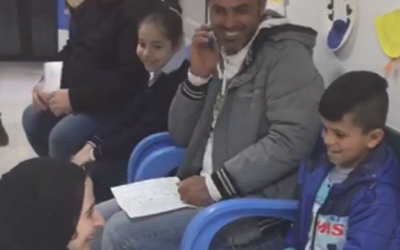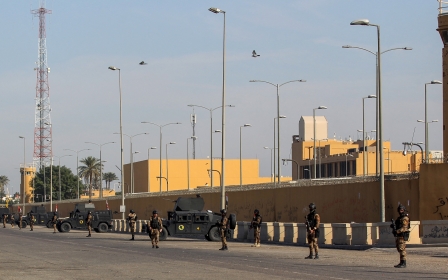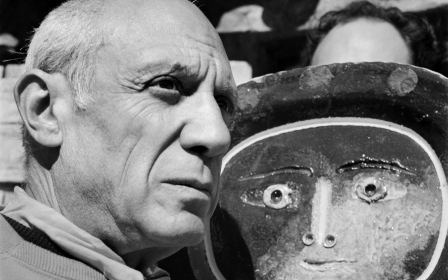Iraq: How life under Islamic State impacted Mosul's deaf community
Between 2014 and 2017, people living in Mosul, Iraq's second-largest city, endured their toughest ever living conditions under the reign of the Islamic State.
Thousands were killed by the extremist group, some still live in refugee camps, while others fled home to seek a better life abroad.
For people with disabilities, living under IS rule doubled their hardship.
Using sign language, deaf Iraqis in Mosul told Middle East Eye how their lives were impacted at the time.
"Frankly, we were living in a giant prison or even worse," said Mosul-based resident Mohammed Taha.
New MEE newsletter: Jerusalem Dispatch
Sign up to get the latest insights and analysis on Israel-Palestine, alongside Turkey Unpacked and other MEE newsletters
Their lives after IS, however, have not significantly improved, and they still feel neglected by the Iraqi government.
Taha, 28, who is deaf, established a local civil society group called Mosul al-Hadbaa Association, which seeks to empower the deaf community to obtain their rights.
The group was founded after the city was freed from IS in 2017, but was officially registered in March 2020.
The NGO seeks to support deaf Iraqis in Mosul by establishing connections between them and other local and international organisations to facilitate support or job search.
Its volunteer interpreter provides them with free sign language interpretation in government agencies or courts.
Their Mosul-based headquarters, located in the Al-Hammam area, consists of a small flat that costs about $100 per month to rent. According to Taha, the flat is not just a headquarters but also a social place where deaf people meet up.
Ahmed Khudr Noah, a sign language expert, volunteered for the NGO to provide free-of-charge interpretation services.
"After liberation of the city from IS, there was a huge need for sign language interpretation, especially when they [the deaf or hard of hearing] wanted to visit a government institution or court," Noah told MEE.
'[IS] lashed me many times for not going to the mosque on time, although I could not hear the call for prayer'
- Taha, Mosul
Like many Iraqis who suffered under the rule of IS, Taha recounted many incidents when the ousted ruling militants sought to enforce their rules using violence and intimidation.
"IS fighters treated us like other people, without paying any attention to our disability," he said.
"For instance, they lashed me many times for not going to the mosque on time, although I could not hear the call for prayer," he added, using his fingertips, with an interpretation by Noah.
In another incident, he was stopped by an IS militant on his way home with a friend while he was carrying a shisha, or waterpipe, banned under IS regulations.
The only thing that saved him from punishment was that his friend explained to the militant that they intended to use the shisha as a vase for roses.
"We were so lucky at that moment," said Taha.
In August 2014, IS enforced a set of rules, including that women must be fully covered; gatherings were not allowed; drugs, alcohol and smoking shisha or tobacco were banned; and performing the five prayers on time in mosques was obligatory.
Recruited by IS
Taha, who was working as a porter in a shop, said that IS tried many times to convince him to join them, but he turned down their requests, explaining that he was deaf.
A video that went viral on social media in September 2015 showed two deaf IS fighters wearing black jumpsuits and carrying weapons while standing at a traffic light in Mosul. Using sign language, one of them asked fellow Muslims to join the group, saying that disability was not an excuse.
In the video, the IS fighter said: "I work in the traffic sector with my brother Abdulrahman. Muslims in the city live in comfort under the caliphate."
Marwan Yassin Ahmed, a 60-year-old Mosul native who is deaf, said that IS rule was lenient at the beginning but then started to get more stringent a few months after their takeover of Mosul.
"At the beginning, IS treated us very well. We were allowed to smoke and wear whatever we liked. But much changed after a couple of months of their rule," he told MEE.
"We did not realise that IS was cheating us in this way."
IS banned use of the internet at home, as well as using smartphones and electronic devices, for fear of information being leaked to the Iraqi government or others outside the city.
Many people told MEE that IS beheaded some residents after suspecting that they used smartphones or chatted with their friends or relatives in other cities via the internet.
Ahmed said that IS members stormed his house in 2015, damaged his TV and satellite, and threatened to kill him if they found any digital device in the house.
Punished for violating dress codes
Weeks after that incident, Ahmed was jailed in an IS prison for a "silly" reason but a "big mistake" according to IS, he said.
"As an IS soldier noticed my 10-year-old daughter watering flowers in the house garden without wearing niqab [face covering], they accused me of violating Islamic rules and then sent me to jail," he said.
"I stayed a couple of days there without food, in a poor health environment.
"How can I force my daughter to wear a niqab when she was only 10? It is incomprehensible to force our kids to do things they do not like or even understand," Ahmed said.
'I told [the IS militant] that I could not speak nor hear, but he thought I was a liar. He lashed me 45 times and then left me'
- Uday Hammoudi, 41-year-old deaf Iraqi
Women rarely went outside the home to avoid being reprimanded by IS police, he said.
IS did not allow women to go out without being accompanied by a guardian.
Uday Hammoudi, a 41-year-old deaf Iraqi, upheld that rule, but he was still punished.
"My wife and I were walking in Bab al-Toub, [a] local old market," Hammoudi told MEE, using sign language interpreted by Noah. "She was fully covered with niqab and gloves; the market was crowded so I lost her.
"While looking for her, by mistake I spoke with a woman who was not my wife. She screamed and called IS to arrest me, then I found my wife. All women looked the same due to the clothes that IS forced them to wear.
"People who knew me well in the market told IS that I was deaf, but they were not convinced. They only left us when they saw my wife come to me. IS treated us as harshly as they treated all other people," he said.
"My wife was telling me all the time that she had difficulty breathing, but I did not have the liberty to let her take off the niqab, in winters or in hot summers."
Men were also expected to abide by IS dress codes.
"Once, an IS militant stopped me while I was heading back home and beat me on my neck because I was wearing normal clothes different from their uniform," said Hammoudi.
"I told him that I could not speak nor hear, but he thought I was a liar. He lashed me 45 times and then left me."
The end of IS rule
For Hammoudi, the end of IS rule was his biggest relief. "It was a historic moment seeing our city empty of IS fighters," he said.
Likewise, Taha said: "There is no comparison between life under IS and today. At least we feel more freedom, we can wear what we like, travel wherever we want, do lots of things that IS forbids. There is food, and Mosul is safer than before."
However, both Hammoudi and Taha believe that the Iraqi government can do more to support them.
"In most countries, there is special care for deaf people, but in Iraq there is zero care by the government," he said.
"The government should offer a monthly salary for us, help us find jobs, and more."
Hammoudi said that, unlike under IS, he can have access to politicians. But he regrets that the politicians only "make promises" with no real action.
"Only in election campaigns, politicians come to us and give us promises to improve our life and provide employment opportunities, but once the elections end, we do not hear from them again," he said.
Middle East Eye delivers independent and unrivalled coverage and analysis of the Middle East, North Africa and beyond. To learn more about republishing this content and the associated fees, please fill out this form. More about MEE can be found here.





